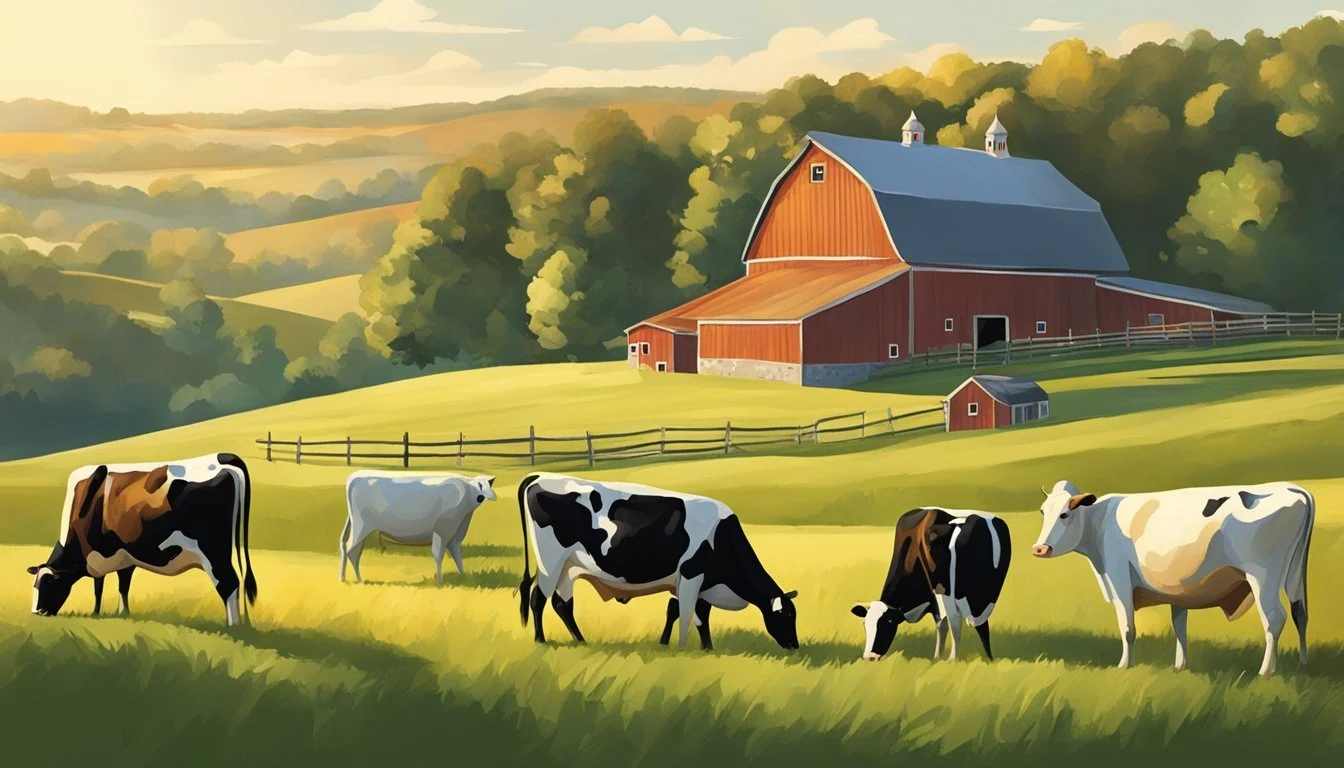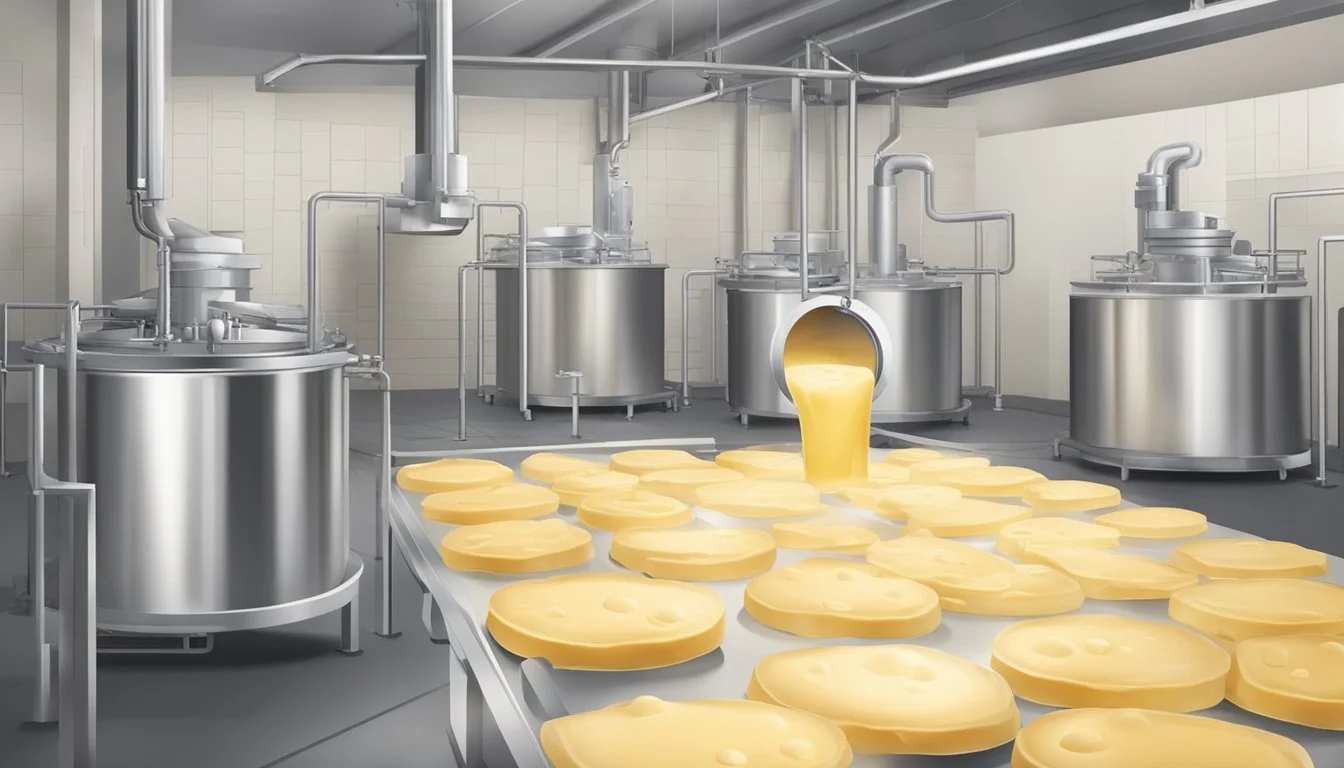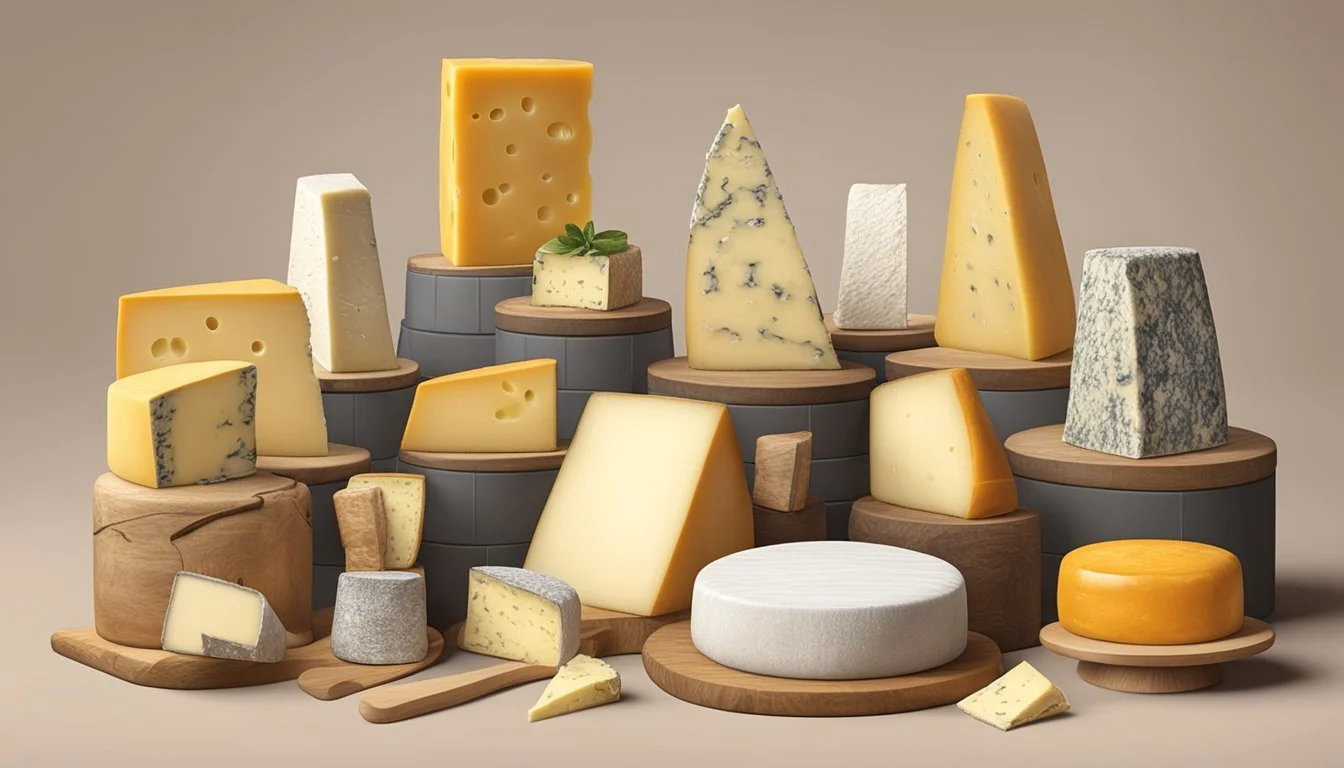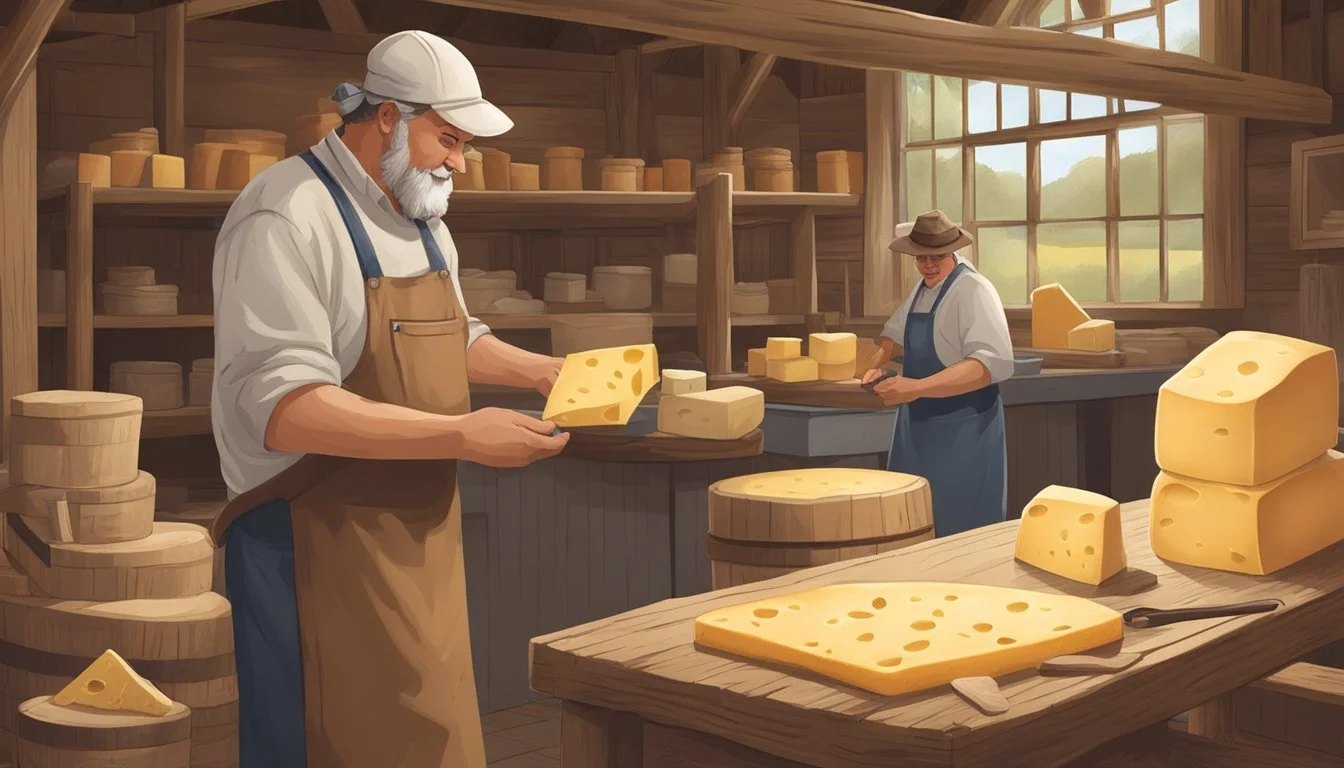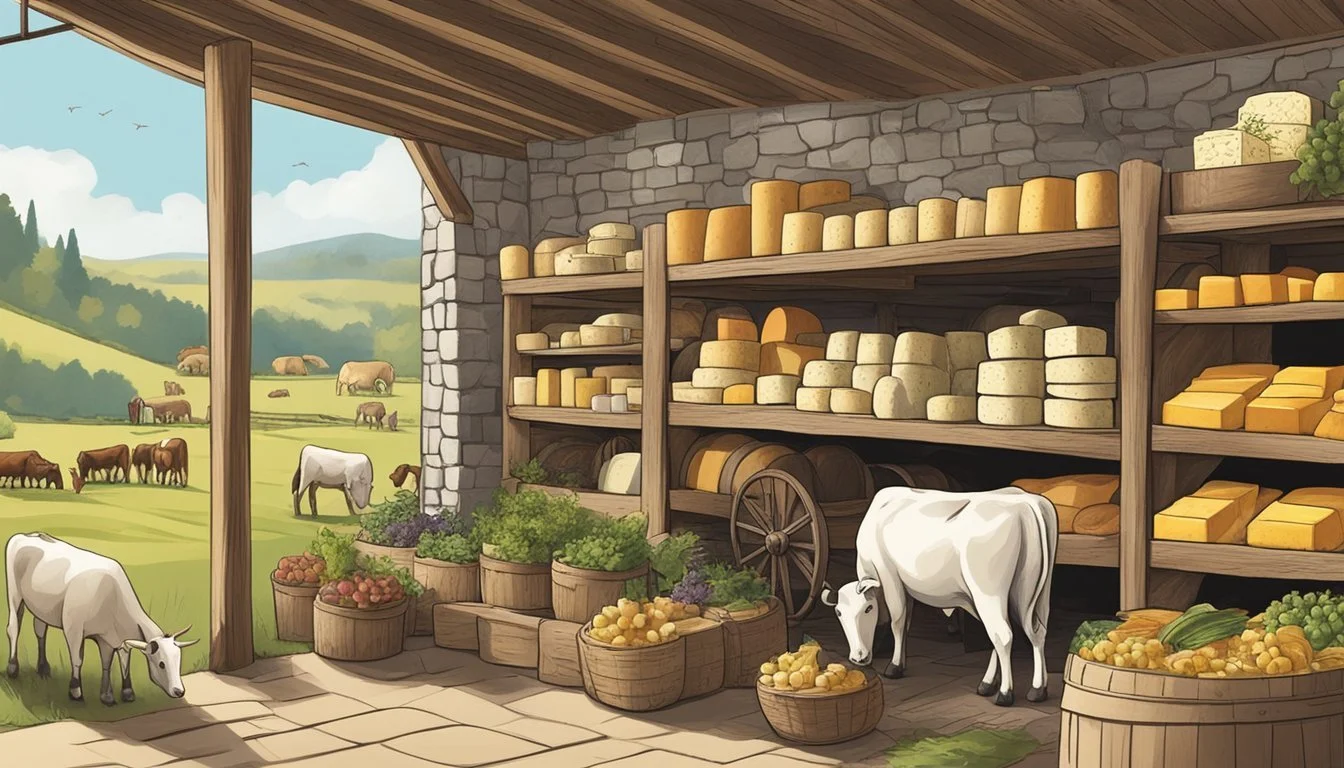Massachusetts Artisan Cheese
A Guide to Local Delicacies
Massachusetts has a rich tradition in artisan cheesemaking that dates back to the early settlers from England. The first dairy cows were brought to the region in 1624, laying the groundwork for a legacy that has flourished over the centuries. Today, over 25 professional artisan cheesemakers operate in the state, with a few more honing their craft in the apprentice stage. They contribute to a diverse array of over 100 types of cheese (What wine goes well with cheese?), demonstrating a keen dedication to quality and the art of cheese creation.
The state's cheesemakers are not only recognized for their historical roots but also for their present-day excellence. Throughout Massachusetts, cheesemakers have garnered numerous awards, a testament to their mastery and the high standards they uphold. The Massachusetts Cheese Guild epitomizes this commitment, representing the collective efforts of the community to produce award-winning cheeses.
Artisan cheese production in Massachusetts is a reflection of the region's deep connection to dairy farming and its continued innovation in the field. These local creators take pride in their ability to transform milk into an array of delicious cheeses, each with unique flavors and textures. The craft is deeply intertwined with understanding the raw materials and employing skillful techniques to create cheeses that are enjoyed by many across the state and beyond.
History of Massachusetts Artisan Cheese
Massachusetts has a rich history of cheese production, tracing back to the early settlers of New England, where it has since developed into a recognized artisan craft with numerous award-winning cheesemakers.
Settlers and Early Dairy Farming
In 1624, settlers from England brought the first dairy cows to what is now the Boston area of Massachusetts. These settlers began the tradition of dairy farming in the region, laying the groundwork for the state's future in cheese production. Massachusetts played a pivotal role as a pioneer in American cheesemaking, as these early dairy farmers utilized their skills from their homeland to produce cheese, which was a practical method for preserving milk.
1624: Introduction of dairy cows to Massachusetts
Preservation: Cheese provided a method for preserving milk
Development of Artisan Cheese Making
Over time, Massachusetts transitioned from basic cheese production to a more refined, artisan approach. Especially notable is the fact that Massachusetts boasts more award-winning farmstead cheesemakers per capita than any other state, including Vermont, a state also known for its cheese. The modern Massachusetts artisan scene encompasses over 25 professional cheesemakers who craft more than 100 types of cheese, each with unique characteristics and flavors. They have collectively received numerous awards, reflecting the high quality and innovation of their products. This acclaim highlights the state's success in developing its artisan cheese identity.
Innovation: Over 100 unique cheeses produced
Professionalization: More than 25 artisan cheesemakers
Massachusetts Artisan Cheese Industry Overview
The Massachusetts artisan cheese industry boasts a vibrant community of over 25 professional cheesemakers and an engaging Cheese Guild. These entities collaboratively foster the growth and recognition of the state's high-quality dairy craftsmanship.
Modern Massachusetts Cheesemakers
Massachusetts cheesemakers produce an impressive range of over 100 types of cheese, contributing greatly to local cuisine and economy. They annually create over 650,000 pounds of cheese, demonstrating robust expertise in dairy processing. A significant number of these cheeses have garnered awards, reflecting the cheesemakers' commitment to excellence. The industry thrives on diversity, with nearly half of the producers using milk from cows, particularly brown Jerseys and black and white Holsteins. The remaining producers predominantly use milk from dairy goats, like La Mancha and Alpine breeds.
Role of the Massachusetts Cheese Guild
The Massachusetts Cheese Guild plays a crucial role in uniting and promoting artisan cheesemakers across the state. It serves as a platform for these artisans to share their craft, collaborate, and gain exposure. The Guild also educates the public about the rich heritage and meticulous process of cheesemaking. By hosting events, such as the renowned Massachusetts Cheese Festival, the Guild showcases the state's dairy farms and artisan cheesemakers, amplifying their contributions to America's culinary landscape. The collaboration between the Guild and local farms creates a sustainable environment that preserves Massachusetts' picturesque open spaces while celebrating the art of cheesemaking.
The Artisanal Cheese Making Process
Artisanal cheese production in Massachusetts is a testament to a tradition that values quality over quantity. At its core, the process involves meticulous control over the selection of ingredients and a careful hands-on approach to cheese crafting.
Selection of Milk and Ingredients
The foundation of any artisan cheese is high-quality milk, often sourced from local farms. Whether it comes from cows, goats, or sheep, the milk's terroir is crucial as it reflects the unique characteristics of the local environment where the animals are raised. Massachusetts cheesemakers prioritize natural feed and humane animal husbandry to ensure the milk's premium quality.
Key Ingredients:
Milk: Fresh and locally sourced milk with a clear flavor profile.
Cultures: Necessary for fermentation, they contribute to the cheese's texture and flavor.
Rennet: An enzyme to separate curds from whey.
Salt: For flavor and as a natural preservative.
Crafting Cheese in Small Batches
Artisanal cheese is crafted in small batches to ensure each wheel of cheese receives the attention it deserves. The process starts with pasteurization, followed by the addition of cultures and rennet. These induce the milk to curdle, forming curds. The curds are cut, stirred, and sometimes cooked, which affects moisture and the texture of the resulting cheese.
After the whey is drained, the curds are placed in molds and pressed. Aging occurs over weeks to years, during which cheesemakers closely monitor the cheeses to develop the desired flavor and texture.
Cheese Crafting Steps:
Pasteurization: (Optional depending on the cheese type)
Curdling: Adding cultures and rennet.
Cutting Curds: To release whey and encourage curd formation.
Molding & Pressing: Shaping the cheese.
Aging: Maturing the cheese in controlled conditions.
Types and Varieties of Artisan Cheese
Massachusetts artisan cheesemakers craft a wide range of cheeses using milk from different sources, each imparting unique flavors and textures that contribute to the state's robust selection of cheeses.
Influence of Different Milk Sources
The types of milk used to produce cheese—cow, sheep, and goat—significantly influence the character and flavor profile of the resulting cheese. Cow's milk cheeses (What wine goes well with cow's milk cheeses?) are often creamier and milder, while sheep's milk tends to yield a rich, buttery texture with a nutty undertone. Goat's milk cheeses are distinctively tangy and can be fresh or aged, each stage offering varying degrees of sharpness.
Cow's Milk Cheeses:
Creamier, versatile in texture from soft to hard.
Examples include Cheddar and Gouda.
Sheep's Milk Cheeses: (What wine goes well with sheep's milk cheeses?)
Dense and rich, often with a complex flavor.
Examples include Roquefort and Manchego.
Goat's Milk Cheeses:
Tangy flavor with a characteristically sharp edge.
Often found in varieties like Chevre and Feta.
Distinctive Regional Varieties
Massachusetts is known for producing both traditional and innovative types of artisan cheese. Prominent among these are Alpine-style cheeses, which are made in the tradition of the Swiss Alps and are known for their nutty flavor and smooth melting qualities. Additionally, the artisan cheese scene in Massachusetts includes an impressive selection of blue cheese, recognized by its bold, pungent flavors and blue or green-veined appearance.
Alpine-style Cheeses:
Nutty, sweet, and ideal for melting.
Local variations mimic the qualities of classics like Gruyère and Emmental.
Blue Cheeses: (What wine goes well with blue cheeses?)
Strong and savory with distinctive veining.
Crafted in a variety with varying sharpness and creaminess.
Local Farms and Cheesemakers
Massachusetts boasts a rich tradition of artisan cheesemaking, underscored by an array of local farms and a roster of skilled cheesemakers. These entities combine traditional methods with innovative approaches to produce award-winning cheeses.
Profiles of Notable Farms
Appleton Farms: One of the oldest operating farms in the country, Appleton Farms is renowned for its commitment to sustainable, organic dairy farming and its line of artisanal cheeses.
Cricket Creek Farm: Situated in the Berkshire Hills, Cricket Creek Farm takes pride in its small-scale production of raw milk cheeses, emphasizing the importance of community and land stewardship.
The Grey Barn and Farm: They are certified organic and craft cheeses that reflect the unique terroir of Martha's Vineyard. Their cheeses are known for their distinct character and high quality.
Ruggles Hill Creamery: This micro-creamery focuses on producing a variety of goat cheeses and is noted for its traditional and handcrafted approach, ensuring premium cheeses with a local touch.
Dancing Goats Dairy: Nestled on a small farm, Dancing Goats emphasizes sustainable, artisanal cheesemaking and is known for cheeses that showcase a rich array of flavors.
Interviews with Massachusetts Cheesemakers
Mozzarella House: Cheesemakers at Mozzarella House are dedicated to preserving the Italian tradition of cheesemaking in Massachusetts, producing mozzarella and other Italian cheeses with a fusion of local taste.
Cheesemaker Focus Mozzarella House Authentic Italian cheesemaking; Fresh local ingredients
Conversations with cheesemakers highlight their use of organic milk and their meticulous process of cheese production, which ensures the highest standards of quality and taste.
Theme Detail Organic Practice Commitment to using organic milk in cheesemaking
Cheesemakers from these farms share a passion for their craft and deeply value their connection to the local community and environment, which is evident in the distinct flavors of their cheeses.
Sourcing and Distribution Channels
Massachusetts artisan cheese enjoys a distinct presence in the market, with various channels facilitating its journey from local farms to consumers' tables.
Farmers Markets and Specialty Shops
Farmers markets operate as a primary source for artisanal cheeses in Massachusetts, often featuring cheesemakers who sell their products directly to consumers. They provide a platform for small-scale producers to share their unique cheese varieties, each with a story of the local terroir. Specialty shops complement these markets by curating a selection of local artisan cheeses, offering consumers a chance to purchase these fine products outside of market days. Both venues pride themselves on promoting local food culture and serve as educational spaces where buyers can learn about cheese origins, production methods, and pairing suggestions.
Farmers Markets: Direct sales, consumer education, community engagement
Specialty Shops: Curated selections, knowledgeable staff, artisan product focus
Supermarkets and Online Sales
Supermarkets have begun to include local artisan cheeses as part of their specialty selections, broadening the availability of these products to a wider customer base. This inclusion reflects a growing interest in regional food systems and supports local cheesemakers. Meanwhile, online sales offer another distribution channel that extends the reach of Massachusetts cheese producers, allowing them to convey their craft to a national audience. With the capability for online ordering and shipping, these cheesemakers can maintain their presence in both local and distant markets.
Supermarkets: Broader consumer reach, specialty sections for local products
Online Sales: National reach, convenience for customers, direct-to-consumer marketing
Achievements and Awards
Massachusetts has carved out a prestigious place in the American artisan cheese industry with its array of award-winning cheeses. Notably, the state boasts a high concentration of farmstead cheese makers who have earned recognition both locally and nationally.
Local and National Recognition
Massachusetts cheesemakers have consistently garnered accolades, reflecting the high quality of their products. At the forefront is the American Cheese Society (ACS), a leading cheese advocacy organization that celebrates American-made cheeses. Massachusetts artisans frequently receive awards from ACS competitions, signifying national excellence. With over 100 types of cheeses crafted within its borders, the state's cheesemakers have impressively demonstrated their ability to stand out amidst stiff competition.
Awards by ACS: Recognition from the ACS underscores the cheesemakers' commitment to superior cheese production.
Local Awards: State-led honors promote and celebrate the innovation and quality of Massachusetts-made cheeses, which has helped increase their visibility and appeal.
The Importance of Awards in Branding
Awards play a critical role in establishing the credibility and brand strength of artisan cheese producers. When a cheesemaker receives an award, it acts as a seal of approval, indicating that their cheese meets high standards of quality and taste.
Credibility: Awards enhance the cheesemaker's reputation, instilling consumer confidence.
Brand Differentiation: Distinctive achievements help differentiate a brand in a crowded market, enabling these artisans to distinguish their products based on recognized quality and craft.
Educational Opportunities
Massachusetts takes pride in a rich culture of artisan cheesemaking that extends beyond the production of cheese to education. Individuals interested in learning about cheese can take advantage of courses and farm experiences that focus on both the science and craftsmanship of cheesemaking.
Cheese Making Courses
Two Goats School of Cheesemaking offers more than basic cheesemaking classes, extending its educational offerings to include advanced courses in bloomy rind cheeses such as Brie and Camembert. Most notably, the school provides a multi-day, comprehensive workshop that dives deep into the intricacies of artisan cheese production. They not only teach the practical skills needed to make cheese but also enrich students' understanding of the underlying science that makes each cheese unique.
For a structured path in cheese education, institutions such as Boston University's Food & Wine Program offer certificate programs and seminars. Their courses cater to a wide range of culinary topics, including specialized cheese education.
Farm Tours and Workshops
The Massachusetts Cheese Guild underscores the state's reputation as a leader in award-winning cheese production. Individuals may visit participating farms to witness firsthand the day-to-day operations and the meticulous process of cheese artisanship from milk handling to the final product. These farm tours often include hands-on workshops where visitors can learn directly from experienced cheesemakers.
Each visit offers a unique perspective into the state's dedication to artisan cheese, as the farms work with milk that varies daily, making every batch of cheese a testament to the cheesemaker's skill. Visitors leave with a deeper appreciation for the craft and the nuances that contribute to the distinct flavors of Massachusetts cheese.
The Cheese Experience
Massachusetts' artisan cheese scene is a testament to its rich dairy history and culinary innovation. The state's cheesemakers craft over 100 types of cheese, each with unique flavors suitable for various pairings and tastings.
Tasting Notes and Pairings
Massachusetts cheeses are characterized by a diverse flavor profile, accommodating a wide range of palates and preferences. When tasting, one may note the sharpness of a local cheddar, the creaminess of a fresh chevre, or the complex funk of an aged blue. Pairing these cheeses with foods and beverages can enhance their taste. A robust blue cheese, for instance, pairs splendidly with the sweetness of local honey or the boldness of a dark chocolate. For beverages, a crisp New England cider or a robust ale can complement the creamy textures and savory notes found in the region's cheeses.
Pairings at a Glance:
Sharp Cheddar:
Beverage: Stout or Port Wine
Accompaniment: Fig Jam or Sourdough Bread
Fresh Chevre:
Beverage: Sauvignon Blanc or Light Pilsners
Accompaniment: Berries or Olive Tapenade
Aged Blue:
Beverage: Bourbon or Ice Wine
Accompaniment: Dark Chocolate or Walnuts (how long do walnuts last?)
Culinary and Gastronomy Tours
The Boston area offers a plethora of culinary tours that include visits to local cheesemakers, providing an immersive gastronomic experience. These tours often showcase the cheese-making process, from pasture to cave-aging rooms, educating visitors on the intricacies of artisanal production. Participants can witness first-hand the care and skill that go into each wheel of cheese and learn about the influence of New England's terroir on the final product. It's not uncommon for a tour to end with a curated cheese tasting, where participants can apply their newfound knowledge of cheesemaking to the sensory enjoyment of the cheese itself.
Whether one is sampling award-winning farmstead cheeses or witnessing the craft behind the scenes, Massachusetts offers a rich cheese experience that connects the heritage of New England dairying to the innovative spirit of its modern-day artisans.
Consumer Awareness and Trends
In Massachusetts, there has been a noticeable shift in consumer behavior as they increasingly seek out local, organic products. This trend is reflected in the artisan cheese market.
Shift Towards Local and Organic Products
Consumers are exhibiting a growing preference for organic and locally sourced foods. In the context of Massachusetts's artisan cheese scene, there is an emphasis on organic practices. Organic cheese is becoming a significant factor influencing purchasing decisions as it aligns with the consumers' desire for natural and environmentally friendly products. The trend is not only towards organic, but also towards products that are handcrafted and have a traceable origin.
Connecting Consumers with Artisan Producers
The connection between consumers and artisan producers is becoming more intimate. Artisan cheesemakers in Massachusetts are building relationships through transparent practices and storytelling, allowing consumers to understand the process behind their cheese. These producers often utilize direct marketing channels such as farmers' markets, community-supported agriculture (CSA), and on-farm shops, fostering a direct link between the product and the consumer. This relationship encourages consumer trust and loyalty, as buyers appreciate the craftsmanship that goes into each cheese.
In summary, as consumer awareness grows, so does the demand for local, organic cheese products. Massachusetts artisan cheesemakers are responding by engaging with their customers, sharing their values of sustainable and handcrafted cheese production.
Challenges and the Future
Artisan cheese producers in Massachusetts face a complex landscape with environmental considerations and the need for continuous innovation shaping their industry's trajectory.
Sustainability and Environmental Impact
Producers are grappling with the necessity for sustainable practices. Environmental concerns pressure cheesemakers to reduce carbon footprints and foster eco-friendly processes. For example, the decline in farmstead cheese production, which uses milk from the cheesemaker's own herd, presents a sustainability challenge as it often ensures a lower transport-related impact.
Innovation and Growth Opportunities
Despite these challenges, there is room for growth and opportunity. High demand for artisan cheeses opens avenues for innovation in the sector. Shifting retail landscapes encourage cheesemakers to explore new sales channels and customer interactions, enhancing education and customer service. This transformation is a testament to the industry's resilience and foresight in adapting to changing consumer behaviors and market conditions.


